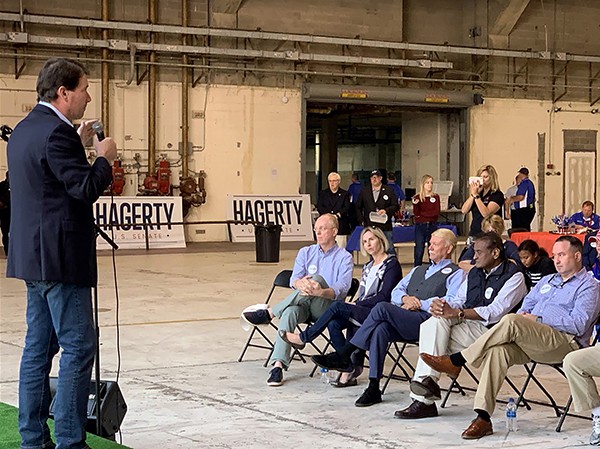For Democrats, especially, the memories of four years ago are still very much alive — not just the nerve-crunching countdown of election night but the hopeful dawning of January 21st, just after Donald Trump‘s inauguration, when, on an unseasonably warm day, multi-gendered masses of Memphians gathered for the Women’s March Downtown — not a protest of the new regime so much as an affirmation that a reckoning would come, that the historical moment could be reversed.
It was the first act, enacted simultaneously in virtually every other American city, of what would come to be known as the Resistance, not just by those involved in it but by Trump, the intended target and unexpected winner of the presidency, who, clearly, could boast his own crowds, with a wholly different set of hopes and fears.
 Jackson Baker
Jackson Baker
Roadside stand, 2020-style
The unprecedented rush of early voters to the polls this year, which began, locally, on Wednesday, October 14th, undoubtedly derives from both sources. Records will almost surely be broken by the end of early voting on Friday of next week, October 29th. A big vote is also likely for Election Day itself — Tuesday, November 3rd — and the real unknown quantity, undoubtedly huge and perhaps decisive, is expected to come in a flood of mail-in ballots, a volume made possible in Tennessee only through the tireless legal efforts of local activists.
As was the case under the wholly different circumstances of 2016, the Democratic candidate — in this case former Vice President Joe Biden — is favored by the polls. Nationwide, that is. Here in Tennessee, where the Republican Party still dominates the electorate, it’s considered to be in the bag for Republican Trump.
The U.S. Senate Race
Nowhere has the generational sea-change been more obvious than in races for the state’s major offices. In 2018, Republicans won decisive victories for governor and U.S. senator over name Democratic candidates after competitive Republican primaries in which the winners — Governor Bill Lee and Senator Marsha Blackburn — were actually decided.
The action was similar this year when GOP senatorial candidates Bill Hagerty and Manni Sethi vied in a bitterly fought Republican primary, with Hagerty, the hand-picked candidate of President Trump, emerging triumphant.
Hagerty, a former state industrial development commissioner and Ambassador to Japan, no doubt expected, like most other observers, that his Democratic challenger would be Nashville lawyer James Mackler, a former Iraq war pilot who had basically been running for two years. But Mackler would finish second in the year’s biggest upset, as unsung Memphis environmentalist Marquita Bradshaw pulled off a win in the Democratic primary.
 Jackson Baker
Jackson Baker
Republican Senate candidate Bill Hagerty with supporters in Millington
Starting the general election with approximately $22,000 in funding, compared to Hagerty’s $12 million, the plucky Bradshaw has advanced her receipts to the level of just under $1 million — still far short of Hagerty’s current $14 million.
The two Senate candidates had been scheduled for a statewide debate on the Nexstar television network, but mostly unexplained circumstances caused a cancellation.
Other Senate candidates on the ballot as independents are: Aaron James, Yomi “Fapas” Faparusi Sr., Jeffrey Alan Grunau, Ronnie Henley, G. Dean Hill, Steven J. Hooper, Elizabeth McLeod, Kacey Morgan, and Eric William Stansberry.
 Jackson Baker
Jackson Baker
Republican U.S. Representative David Kustoff at the podium
U.S. House Races
Incumbent Congressmen David Kustoff and Steve Cohen are also up for re-election. Eighth District Representative Kustoff, a Republican, is opposed by Democratic nominee Erika Stotts Pearson and by independents Jon Dillard and James Hart. Ninth District incumbent Cohen, a Democrat, is opposed by Republican nominee Charlotte Bergmann and by independents Dennis Clark and Bobby Lyons. Both incumbents are expected to win handily.
 Jackson Baker
Jackson Baker
at TV taping
Legislative Races
In Shelby County itself, there are several competitive legislative races, and, as is the case with the presidency, most of them involve comeback hopes on the part of Democrats, who over the last several decades have seen their ancestral control, in every place but the inner city, yield to a new breed of buttoned-down Republicans. The competitive races are those along the line where city and suburb meet in a zone of shifting populations.
 Jackson Baker
Jackson Baker
Dems on display
State House District 96, which is focused on Cordova, a sprawling mix of blue- and white-collar ethnicities, reverted to the Democrats four years ago. Democratic State Representative Dwayne Thompson faces a challenge there from Republican regular Patricia Possel, well-known for her efforts in the de-annexation movement.
In House District 83, a somewhat more glam neighboring district to the immediate south, incorporating hunks of East Memphis and Germantown, a largely managerial class of voters will decide between incumbent GOP Representative Mark White, who heads the House education committee, and Jerri Green, a promising new Democratic face who hopes to punish White for his pro-voucher efforts in an area whose public schools are a major source of local pride.
 Jackson Baker
Jackson Baker
House candidate Gabby Salinas
District 87, the third part of this triadic battle zone, lies to the north, stretching from parts of East Memphis through Bartlett to the Gray’s Creek/Eads area. The District 87 seat is open. Incumbent Republican state Representative Jim Coley, a teacher, is retiring. The contestants are the GOP’s John Gillespie, a Republican activist and grant coordinator at Trezevant Episcopal Home, and Gabby Salinas, a scientific researcher and former cancer patient at St. Jude Children’s Research Hospital whose backstory of immigration from Bolivia and survival has gained her abundant publicity and inspirational cachet over the years. Salinas came very close to upsetting GOP mainstay Brian Kelsey in a state Senate race two years ago, and her message of Medicaid expansion and her ample finances give her good chances again.
 Jackson Baker
Jackson Baker
State Rep. John DeBerry speaks to GOP group
State District 90 is where a fourth legislative race has attracted serious interest this year, and the main issue is party loyalty itself. For the last 26 years, minister/businessman John DeBerry has represented the highly diverse district, which connects Frayser and South Memphis with sections of Midtown and Chickasaw Gardens.
An African American (and uncle of the aforesaid Senate candidate Bradshaw), DeBerry has consistently opposed abortion and supported school vouchers, and his stand on those two issues was, along with his affiliation with the conservative American Legislative Exchange Council (ALEC), enough to provoke the state Democratic executive committee to remove him from the Democratic ballot this year.
On the strength of his name recognition and with somewhat more than tacit encouragement from the local Republican establishment, DeBerry is campaigning for re-election as an independent. He is opposed by Democratic nominee Torrey Harris, a member of the LGBTQ community who works in human resources and has the declared support of numerous progressive sources to go with the party label.
The other legislative races are either unopposed or pro forma cases. Incumbent Democrat Barbara Cooper is opposed by Republican Rob White in District 86, and Republican incumbent Kevin Vaughan has a Democratic opponent in Lynette Williams. Democrat Julie Byrd Ashworth challenges GOP incumbent Paul Rose in District 32.
Municipal Races
Various local municipalities have elections on November 3rd, as well:
In Bartlett, incumbent Alderwoman Paula Sedgwick in Position 6 is opposed by Kevin Quinn. Brad Ratliff, and Portia Tate are on the ballot for School Board, Position 1.
In Germantown, here are several Alderman races: Sherrie Hicks vs. Terri Johnson for Position 3; John Paul Miles, Roderick Motley, and Brian Ueleke for Position 4; and Jon McCreery and Brandon Musso for Position 5. There is one Germantown School Board race: Brian Curry and Scott Williams for Position 3.
In Lakeland, Jim Atkinson, Scott Carmichael, and Wesley Alan Wright are vying for the two open city commissioner positions.
In Millington, the position of Alderman for Position 7 is sought by Mike Caruthers and Tom Stephens; school board races are between Marlon Evans and Greg Ritter for Position 1, and Mark Coulter and Deanna Speight for Position 3.
In Collierville, Harold Curtis Booker, Thomas J. Swan, and John Worley are competing for Alderman Position 1. Position 3 is sought by William Boone, William Connor Lambert, Missy Marshall, Rick Rout, Scott Rozanski, and Robert Smith. Position 5 is contested by Gregory Frazier and John E. Stamps. For Collierville School Board, Position 3, the contestants are Madan Birla, Paul Childers, Rachelle Maier, and Kristina Kelly White.
REMINDER: The deadline to request a ballot by mail is Tuesday, October 27th, and the completed ballot must be received by Tuesday, November 3rd, by close of polls. However, voters who are at least 60 years old, people with underlying health conditions including conditions arguing for a susceptibility to COVID-19, and those caring for others susceptible to the illness can apply for an absentee ballot.
 Jackson Baker
Jackson Baker